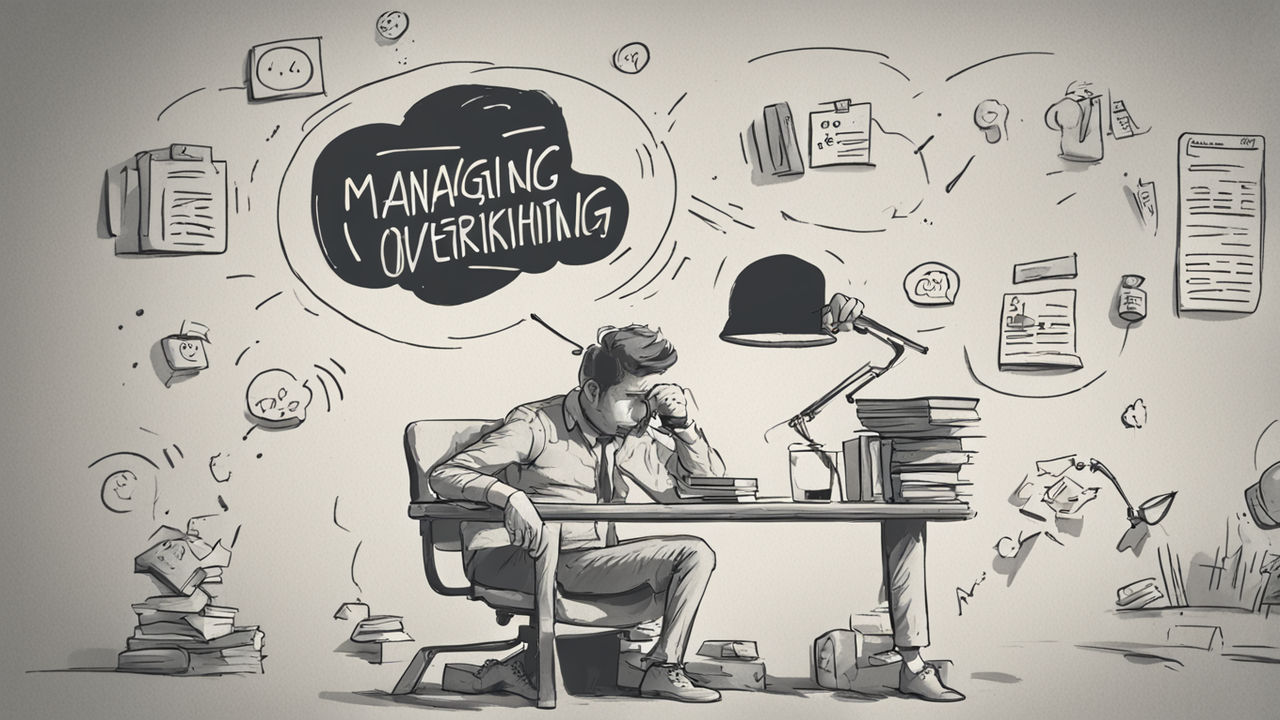IN TODAY’S FAST-PACED ENVIRONMENT, PEOPLE OVERTHINK. Many worry, relive previous situations, and consider “what ifs.” This constant mental chatter can cause anxiety, stress, and fatigue. But imagine there was a way to break this cycle and find serenity. Try meditation, which can help you relax and stop overthinking. This post will explore various meditation approaches to help you achieve relaxation.

Managing Overthinking
“Overthinking” Explained
If you repeatedly think about the same thing, you may be overthinking. Breaking free from trapped decisions or ideas becomes problematic when this cognitive pattern becomes habitual. Symptoms include dwelling on the past or future, engaging in excessive hypotheticals, and persistent overanalysis.
Mental Health Impact
Your mental health might suffer significantly from overthinking. Worry and excessive analysis can spiral out of control, increasing stress and anxiety. This ongoing mental engagement may impair sleep, focus, and overall happiness. Constant mental juggling can cause anxiety, making it challenging to relax and fully enjoy life.
The Reasons People Overthink
Overthinking often involves rumination and hypervigilance. Hypervigilance involves staying excessively alert for potential threats, whereas rumination consists of repeatedly dwelling on the same thoughts. Both behaviors activate the sympathetic nervous system, leading to elevated levels of cortisol and stress hormones. This physiological reaction can worsen overthinking, creating a vicious cycle of anxiety and stress.

Guide to Meditation’s Benefits
Define Meditation
Meditation is a practice designed to help you relax and focus. It draws from various philosophical and spiritual traditions to increase awareness and serenity. By focusing on the present moment, meditation can help you break the cycle of overthinking and calm your mind.
Benefits of Meditation
Meditation offers numerous benefits, including:
- Stress Reduction: Regular meditation helps relieve stress by lowering cortisol levels.
- Enhanced Cognition and Clarity: Meditation improves concentration, mental clarity, and cognitive function.
- Improved Emotional Regulation: Meditation aids in regulating emotions, making negative thoughts less impactful.

Meditation Techniques for Stress Reduction
1. Mindfulness Meditation
Mindfulness Meditation involves nonjudgmentally observing your thoughts in the present moment. This technique encourages you to be present with your mind, heart, and body anytime. By acknowledging these experiences without attachment, you can regain mental control.
How It Helps
Engaging in mindfulness meditation can alleviate concerns about the past and future. By centering your attention on the moment, you can disrupt rumination and establish a peaceful sanctuary within your mind.
Useful Steps
- Choose an Uninterruptible Area: Find a place you won’t be disturbed.
- Focus on Breathing: Pay attention to your breath as you inhale and exhale deeply and gently.
- Observe Your Thoughts: When your mind wanders, gently bring your focus back to your breath.
Benefits
Regular mindfulness meditation can help you develop a more objective view of your thoughts, reduce their emotional charge, and manage overthinking more effectively.
2. Loving-Kindness Meditation (Metta)
 Loving-Kindness Meditation (Metta) focuses on cultivating love and compassion for oneself and others. This practice involves silently repeating positive affirmations and extending these feelings to others, building empathy and connection.
Loving-Kindness Meditation (Metta) focuses on cultivating love and compassion for oneself and others. This practice involves silently repeating positive affirmations and extending these feelings to others, building empathy and connection.
How It Helps
Shifting your attention from thoughts to affirmations through Loving Kindness Meditation can help alleviate the tendency to overthink. This practice promotes a perspective toward yourself and those around you, lessening the influence of critical thoughts.
Useful Steps
- Sit Comfortably: Find a position that allows you to relax.
- Start with Yourself: Repeat phrases such as “May I be happy, may I be healthy, may I be safe.”
- Expand Your Focus: Gradually extend these well-wishes to loved ones, acquaintances, and all sentient beings.
Benefits
Engaging in Loving Kindness Meditation can help cultivate a emotional state lessen the presence of negative thought patterns and nurture a feeling of tranquility, within oneself.
3. Body Scan Meditation
Body Scan Meditation systematically focuses on different body parts, observes sensations, and releases tension. This practice helps you tune out racing thoughts and tune into your body by concentrating on the present.
How It Helps
Focusing on physiological sensations helps Body Scan Meditation keep you present and reduce overthinking. Identifying and relieving bodily tension improves relaxation.
Useful Steps
- Lie Down or Sit Comfortably: Choose a position that allows you to relax fully.
- Focus on Your Body: Start at the top of your head and work your way down to your toes.
- Notice Sensations: Observe areas of tension or discomfort and consciously release them.
Benefits
As a complete strategy for managing thoughts, Body Scan Meditation helps reduce stress and anxiety symptoms.
4. Breathing Exercises
 Breathing Exercises involve using controlled breathing techniques to calm the mind and body. Deep, rhythmic breathing activates the parasympathetic nervous system, promoting relaxation and reducing tension.
Breathing Exercises involve using controlled breathing techniques to calm the mind and body. Deep, rhythmic breathing activates the parasympathetic nervous system, promoting relaxation and reducing tension.
How It Helps
Focused breathing helps anchor your attention away from intrusive thoughts, providing a simple yet effective way to manage overthinking. It also helps regulate your physiological stress response.
Useful Steps
- Choose a Breathing Method: Examples include the “4-7-8” technique or alternate nostril breathing.
- Practice Deep Breathing: Inhale deeply for four seconds, hold for seven seconds, then exhale slowly for eight seconds.
- Refocus as Needed: If your mind wanders, gently bring your attention back to your breath.
Benefits
Breathing exercises are a quick and accessible way to reduce stress and improve mental focus, making them an excellent tool for managing overthinking.
5. Guided Visualization
Guided Visualization involves creating a mental image of a peaceful scene to help declutter the mind and relieve stress.
How It Helps
Guided Visualization can shift your focus from overthinking to a calming mental image, enhancing overall relaxation and well-being.
Useful Steps
- Use a Guided Script: Follow a guided meditation script or audio recording.
- Engage Your Senses: Imagine experiencing a serene environment’s sights, sounds, and sensations.
- Immerse Yourself: Fully engage with the visualization as if you were physically present.
Benefits
Guided Visualization lets you detach your mind from stressful circumstances, promoting relaxation.

Establishing a Meditation Pattern in Your Daily Life

Consistency is vital to benefit from meditation fully. Establish a routine by setting aside dedicated time each day. Begin with shorter sessions and gradually increase them as you become more comfortable with the practice.
Overcoming Daily Challenges
Challenges such as restlessness and irritability can make meditation difficult. To overcome these obstacles, be patient with yourself, practice regularly, and set achievable goals. Remember, meditation improves with practice, so persistence is essential.
Watching Development
Track your feelings and thoughts to assess the effectiveness of your meditation practice. Keep a journal to note any mental and emotional health improvements, such as reduced stress or enhanced focus.
A Viable Alternative to Sitting Meditation
So far, we have been discussing a sitting meditation routine. You can replace it with walking meditation if you cannot follow the routine.
Walking Meditation: A Substitute for Sitting Meditation

Actual Success Stories

People Who Overcame Overthinking with Meditation
Meditation has proven effective in reducing overthinking and improving mental health. For instance, a busy professional, Jane found that daily mindfulness meditation helped her feel more focused and less anxious. Similarly, Mark, who struggled with exam anxiety, used deep breathing and guided visualization to improve his performance and calm his mind.
Important Takeaways
These success stories highlight the transformative power of meditation. They demonstrate how consistent practice and openness to different techniques can significantly improve mental well-being.

Conclusion

Meditation can help you manage overthinking but requires regular effort and practice. Techniques such as Guided Visualization, Body Scan Meditation, Loving-Kindness Meditation, and Mindfulness Meditation offer valuable tools for calming your mind. Remember, meditation is about adapting to your thoughts rather than eliminating them. Be patient with yourself and embrace the journey to discover the benefits of a tranquil mind. Controlling your thoughts may lead to a more self-aware, peaceful, and purposeful existence.

ABOUT THE AUTHOR

SIR PERCIVAL has always been a teacher at heart, and even in retirement, his passion for teaching and inspiring others still burns brightly. He shares the universal relevance of life’s wisdom in his writings, believing it can resonate with everyone. His experiences as an educator have shown the transformative power of these ideas, sparking motivation to embrace life fully.
While retirement has moved him away from the traditional classroom setting, writing allowed him to connect with a wide range of people and provide them with guidance and motivation when needed. This new adventure holds immense potential to impact his life and others positively. His ultimate goal is to help individuals appreciate the beauty of life and find happiness along their unique journeys.







